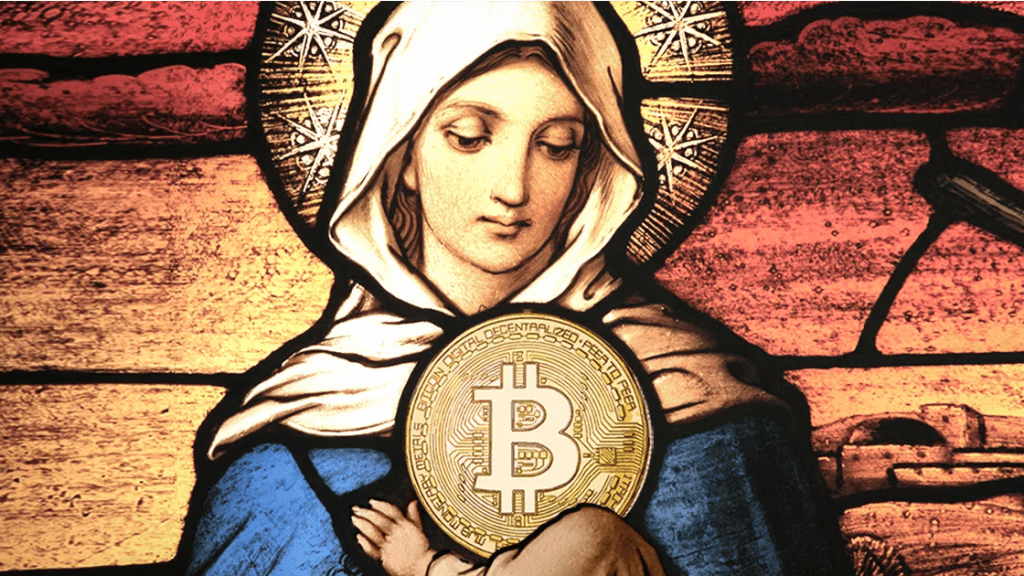
LiC Pt.2: The Theology of Bitcoin
This is the second in a series of posts I’m writing to digest and reflect on what I learnt in the Blockchain and Cryptocurrency space where I spent a large chunk of my time professionally last year.
This week, a philosophical take on Bitcoin.
Faith
Bitcoin was brought into being in January 2009 when its pseudonymous founder, Satoshi Nakamoto mined block zero, but I’m not here to give a history lesson. For that I can recommend Digital Gold by Nathaniel Popper which was recommended to me in my first weeks in the sector and covers the early years of the ‘currency’ and the assorted cast of cypherpunks, coders, and kooks who were crucial to its establishment.
It’s important to understand that Bitcoin has this (pre)history because it is the Ur-Cryptocurrency. There were others before, such as b-money and Bit Gold, but Bitcoin was the first to gain any kind of real adoption. For those who ideologically believe that trustless peer-to-peer money created beyond the control of any central authority or government is the future, there can be only one and it’s Bitcoin. The next piece in this series will cover what I see as the potentially dystopian ramification of what the faithful call ‘Hypercoinization’ but what’s important to understand for now is that for true believers, all other tokens and blockchains are simply and pejoratively ‘Crypto’. For those peering through the looking glass into this gonzo world of expensive jpegs, unregulated derivatives and laser-eye memes, it may all look the same, but here religion provides a useful analogy. Sunni and Shia, Catholic and Protestant, Bitcoiner and Crypto Bro. It’s worth noting here that someone who has Bitcoin and a ‘Bitcoiner’ are two different things. Every Crypto Bro has some Bitcoin, but they are not Bitcoiners.
Think of Ethereum as The Break from Rome. Kinda
Zealots and Theologians
Most Pop-cultural SGHTs (see my previous piece) are based on the frothy world of DeFi and NFTs that sprung out of the pandemic-induced crypto hype cycle and are based on Ethereum or Ethereum derived chains, whether Layer 2s (chains built on top of the Ethereum chain) or alternative Later 1s – standalone ‘new’ distributed ledgers. These amount to publicly viewable ‘programmable money’ – essentially contracts that ‘do’ certain things in certain conditions or represent certain “assets” – real or imagined. Bitcoin can’t actually do any of this. Hence ‘Digital Gold’, a store of value backed by nothing other than its own intrinsic difficulty to produce and hard coded scarcity; only 21 million coins can ever be minted. It’s expensive to transact in, energy intensive to issue and maintain, and impossible to do anything smart with. ‘Maxis’, the most bullish of Bitcoin believers, will tell you that this is ‘a feature, not a bug’. In fact, if you were to point out any of the myriad issues with Bitcoin, either as a currency or as a store of value you’d be met with a response patiently explaining that whatever glitch you’ve seemingly observed is in fact all part of the beauty, part of Satoshi’s design. So far, so mystic.
The reality is, that Bitcoin is not just a technology, but also a cult. Or at least a very fundamentalist religious sect. Ironic for a group who believe that they have the only rational answer to a financial world gone mad. The core belief for them, the day of judgement, is Hypercoinisation, where Bitcoin becomes the global reserve currency and the backbone of a freer (but certainly not fairer) financial system. Though there are some lesser anti-state collectivist narratives within the community, this is primarily ultraneoliberal economics refracted through the post modern chaos of bailout, bank runs, inflationary bubbles and ZIRP. In that sense, it is both a social and economic phenomenon of the ‘Long Interregnum’, providing financial access and mobility, but also a sense of belonging and belief in an increasingly atomised and digitised world. Holding onto Bitcoin – ‘HODLing’ – no matter what the price does is the supreme article of faith.
Losing their Religion
Like any faith, there is a truth at its core. Bitcoin and crypto more broadly does have a role to play in rebalancing our once and future financial system. Bailouts post 2008 favoured institutions over individuals and the current mainstream economy is excluding more and more people from its avenues for wealth creation. But to do this, culture must eat technology. Not the other way around. Bitcoin could do well to learn from other religious missionaries down the years, who took a syncretic approach, adapting flexibly to the culture into which they were proselytising.
This has been the reality for any major technology, adoption relies on a form of cultural Judo, where you have to work with the momentum of existing behaviours and habits; technology moves fast but people change slowly.
Culture eats technology; not the other way round